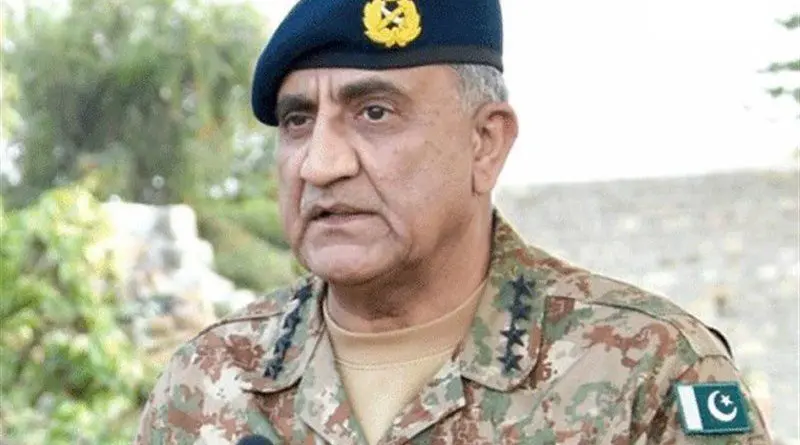General Bajwa Leaves Behind A Meritorious Legacy – OpEd
By Arooba Hamid
Considering the most powerful position in the country, Chief of Army Staff is expected to ensure a peaceful, secure and stable environment in the country. With regards to this, General Qamar Javed Bajwa has proved to be a person of professional qualities, having performed his duties commendably. General Bajwa, after serving the country for six years, will be retiring on November 29, 2022 – leaving behind a meritorious legacy. General Bajwa repeatedly stated that military as an institution has remained a stabilizing factor in dealing with the internal challenges and finding a balance in global politics through military diplomacy. Military diplomacy has become even more significant when it comes to achieving national objectives like the economy, trade and security, and foreign relations, etc. His decision to keep army apolitical in the country through successful approach to foreign and domestic policies was termed as the “Bajwa Doctrine” which brought good name to the institution.
Taking a view at military diplomacy for welfare of the country under General Bajwa, Karkey Karadeniz Electrik Uterim dispute settlement is the case in point. Karkey Karadeniz Electrik Uterim – a Turkish company was found involved in corruption. The evidence during the prosecution was presented to the International Centre for Settlement of Investment Disputes (ICSID) Tribunal by the Core Committee. Pakistan Army amicably resolved the dispute and saved Pakistan from a penalty of $1.2 billion imposed by ICSID. Similarly, Pakistan was saved from a penalty worth $11 billion in the Reko Diq case. Reko Diq was a project aimed at excavating huge gold and copper reserves from the site in Balochistan. It is a step towards projecting soft and investment friendly image of Pakistan that aims for brining major economic benefits for people of Balochistan. With regards to FATF, it was through concerted efforts of General Bajwa that Pakistan was able to project its progress as sustainable and irreversible, addressing various legal, financial and terrorism-related aspects through timely enactment of the laws.
While the world was struggling to deal with the pandemic and its challenges, Pakistan’s military under the leadership of General Bajwa took lead to strategize and put to effect a National Command and Operation Centre (NCOC). The Military’s organizational and administrative skills were put to good use in the establishment of a state-of-the-art facility at the right time. Due to the institution’s synergized efforts, Pakistan not only tackled the Covid-19 but also averted a looming economic tragedy. The pandemic exposed the terrible state of the health sector. However, the NCOC managed to cope with the emergency through its competency. The local army corps had joined with provincial administrations to implement and enforce the COVID-19 policies.
Considering General Bajwa’s ventures for a peaceful neighborhood, the military leadership was a key player in resolving the Afghan crisis, paving the way for a negotiated settlement between the United States and the Taliban. Prior to this negotiated settlement, the military leadership played a key role in FATA merger with Khyber Pakhtunkhwa, resolving a longstanding demand of the people of the tribal areas. To further bring peace to the region, Pakistan Army also initiated border fencing on the western border; which has helped in securing the country against militants and terrorist attacks. The military’s resolve under General Bajwa’s tenure made it possible to permanently secure the western border through the most challenging project of fencing, which Pakistan completed within a period of 4 years. The significance of the arduous task can be gauged from the fact that if the border had not been secured through fencing, the post-US withdrawal period could have triggered another spell of terror attacks inside Pakistan.
It is noteworthy that the military must be credited for giving a befitting response to the aggressive postures of India time and again – Operation Swift Retort remains a testimony to the fact. Capturing Indian Wing Commander Abinandan, the befitting response to the Indian provocations on the Line of Control (LoC), and heavy losses inflicted on the Indian side proved to the latter that Pakistan is capable of defending and upholding its territorial integrity.
In a nutshell, Pakistan remained the center of attention under General Bajwa, due to its increasing strategic significance in the domestic politics, international events and the US withdrawal from Afghanistan after 20 years of War on Terror. His proactive military diplomacy consolidated Pakistan’s significance both internally and externally. During his tenure based on six years, Pakistan was brought closer to the Gulf region, peace was ensured across the Western border, internal stability improved that contributed towards national development. General Bajwa’s leaves behind a legacy as an Army Chief which will be remembered both by the public in general and the Army in particular. His efforts for upholding national development, integrity of constitutional values, ensuring security and support during COVID19 remained the key highlights of his tenure as Army Chief.
Arooba Hamid is an independent researcher.

